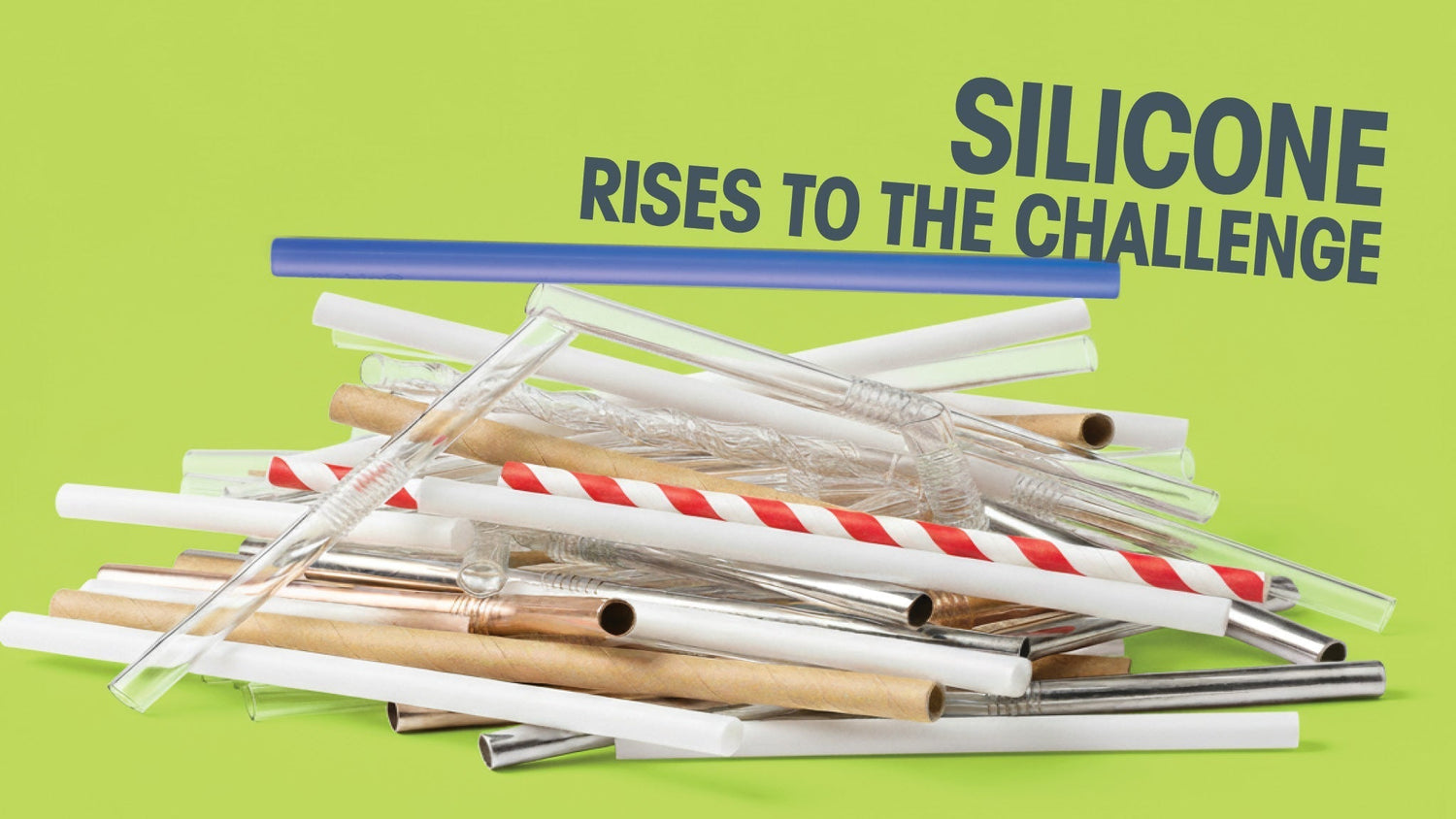An exciting competition is taking place— and it's going to disrupt the plastic industry. The goal is to reduce thin-film plastic pollution and eventually eliminate its use from all industries by creating a sustainable + biodegradable alternative.
At GoSili we’re all about kicking plastic to the curb. And to achieve this, we’re supporting those who are working to create sustainable solutions aiming to replace plastic. Because the reality is— we depend on plastic way too much. And without better innovation to replace it, we’ll continue to churn out plastics and pollute our oceans and communities.
Thankfully, we’re not the only ones committed to creating a better future for you and all generations to come. That’s why we’re teaming up with Tom Ford and Lonely Whale, to paint a picture of what these sustainable plastic replacements look like. And implementing them into the supply chain.
The winner of the competition gets $1.2 million— but the real prize is healthier oceans, clean communities, and less plastic pollution.
What’s The Competition All About?
Tom Ford and Lonely Whale’s 52HZ teamed up to create this unique competition where the end goal benefits all of us. With an outstanding judge panel, experts in the field, and a set of committed entrepreneurs, innovators, designers, and trailblazers— this competition aims to create a sustainable, biodegradable thin-film plastic replacement.
Because we need it. Because the planet needs it. Because our kids and all future generations need it.
But this goes way beyond simply creating a replacement. The competition aims to craft a product that can be sustainably produced at scale to meet the current demand. The winning innovation will be tested on the different businesses that are early adopters— and we are happily one of those businesses.
The Early Adopters
![An image that reads: [To help scale and implement the winning thin-film plastic alternatives in the market, Tom Form International, Stella McCartney, dell technologies, Gosili, HP Inc, Herman Miller, Imperial Dade, Leclub, and ROQ are committing to implement a trial utilizing these sustainable materials for their packaging solutions.].](https://cdn.shopify.com/s/files/1/0323/9349/4661/files/New_Early_Adopter_Quote_Cards-07_480x480.jpg?v=1635793837)
By committing to testing the products, we’re turning the goal of eliminating thin-film plastic into a reality. Innovation without action to back it up doesn’t create the impact it should. And that’s not what we’re all about in this competition.
Along with Stella McCartney, HP Inc., TOM FORD International, Dell Technologies, Herman Miller, Imperial Dade, LeClub, and ROQ.US, we’ll be testing and implementing the winning innovation. And if it all works out— and we’re sure it will— we’re committed to buying the product and using it in our supply chain.
Goodbye thin-film plastic. It was nice while it lasted… sort of.
Why #UnwrapTheFuture?

Technology and innovation are what push us forward. That’s the story of how plastic was born. And with the same idea— we’re putting an end to it. Innovation holds the power to decide the fate of our planet— and we’re certain the future holds incredible promise.
Promise of a better future for all. Promise of clean, healthy communities free of plastic pollution. A promise of clean air and water where both humans and animals/ecosystems coexist and thrive.
We’re unwrapping the future because it’s projected that by 2040 there will be 1.3 billion tons of plastic polluting in our oceans. But we’re just in time to stop it.
Join us in #unwrappingthefuture and let’s tackle plastic pollution together. For the kids of today and for the kids of tomorrow.
The Problem With Thin-Film Plastic…

There is more than one problem, actually. Thin-film is one of the most used plastics worldwide, and it’s virtually impossible to recycle it. Out of the 11 million tonnes of plastic that leak into the ocean every single year, 46% is thin-film.
The plastic bag you use sometimes for only a couple of minutes outlives you by many generations. It continues to pollute our waters and landscapes for hundreds of years to come.
The plastic bag problem is nothing new. Plastic bag bans continue to sweep the US and the globe— but sustainable alternatives to replace them aren’t. And to truly phase-out thin-film plastics, we need solutions. We need alternatives. We need innovation.
And this competition aims to do just that. Create a scalable, biodegradable, sustainable solution to replace thin-film plastic for good.
Plastic is amazing at what it does— protect and contain food and other items during selling, shipping, and handling. But the price we’re paying for this is way too high. The end goal is to create a product that looks and acts like plastic but without the harmful side effects.
The Facts Are…
- Only 20% of the ocean has been explored by humans— yet plastic pollution reaches the deepest parts of our seas.
- 46% of all plastic that leaks into the ocean every year is thin-film plastic
- Plastic bags are very hard to recycle. In fact, curbside recycling doesn’t take any kind of thin-film plastic.
- Over 1 million animals, including sharks, turtles, and seabirds, are killed every year due to plastic pollution.
The numbers don’t lie. But we’re driven and committed to turning these numbers around. Every step forward towards a sustainable future counts. Even the baby steps.
Meet The Change-Makers (aka, The Finalists!)
After almost three years of research + collaboration, eight finalists have been chosen! This marks the beginning of the testing phase and an exciting step forward in tackling plastic pollution.
These are the 8 innovators selected:
1. Genecis
Genecis is a Canadian biotechnology company based in Scarborough, ON. They're reprograming bacteria to make premium materials from low-value organic waste.
2. Kelpi
Kelpi is an eco-friendly biotech company from Bath, UK. They're harnessing the properties of seaweed to create compostable, marine-safe, low-carbon bioplastic packaging.
3. Lwanda Biotech
Lwanda Biotech is a Kenyan social enterprise based in Kisumu. They're addressing both community-level plastic pollution and agricultural waste by developing alternatives to thin-film plastic packaging.
4. Marea
Marea is an Icelandic start-up making biodegradable bioplastics a reality. They're leveraging sustainable local algae streams and creating a replicable model for thin-film alternatives that fully biodegrade.
5. Notpla
Notpla is a start-up based in London inspired by the way nature encapsulates liquids. Their mission is to make plastic waste disappear by pioneering natural-membrane packaging using seaweed as an alternative to single-use plastic.
6. Sway
Sway is an American-based company making home compostable, seaweed-based alternatives for thin-film plastic packaging. Their aim is to offer a carbon-negative material at scale.
7. Xampla
Xampla is a University of Cambridge spinout inspired by the strength of spider silk. They're turning proteins from common plant sources, like peas, into high-performance plastic-alternative materials.
8. Zerocircle
Zerocircle is a company based in India. They're making wildlife and ocean-safe packaging materials from locally cultivated seaweed that dissolves harmlessly in the ocean after use.
How Can You Show Support?
The applications for the competition are now closed, and the finalists are working to replace thin-film plastic for good. But that doesn’t mean you can’t support the initiative! A few ways to get involved are:
Share with your friends and family
Awareness is the first step towards change! Share the statistics with friends. Tell them about the competition and its goal. A simple share on your social media can create a ripple effect of good!
Don’t forget to follow @lonelywhale and @gosiliproducts to stay up to date with the competition!
Refuse plastic
An easy way to reduce plastic pollution is by simply not relying on plastic so much. Small habit changes make a difference! Carry your own bags, bring your own cup, opt for reusable silicone snack bags! Remember, baby steps have a huge impact!
Support businesses doing good!
There are many companies out there causing incredible damage to our environment. But there are just as many doing incredibly positive things too. And the best way to use the influence of your money is to support the companies that care. The ones showing up for you and for the environment.
Support our mission to put an end to plastic pollution— shop for our Ocean Collection here.
1% of all profits from our Ocean Collection goes to ocean clean-up and conservation!





